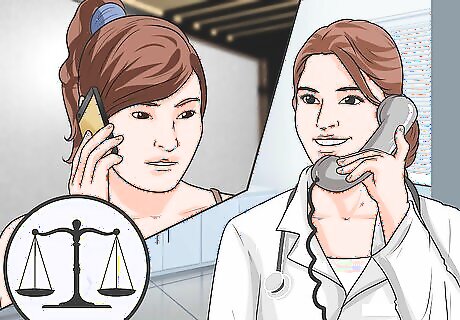
views
X
Research source
If you feel your rights have been violated by the attorney you hired to represent you, you may be able to write a letter or file a complaint against that attorney.[2]
X
Research source
Determining the Grievance You Have

Consider who you can make a complaint against. If you have a grievance against an attorney, you may want to write them a complaint letter or file a formal complaint with the state they practice in. While some states limit your ability to file a complaint against an attorney you have not hired, most states will allow you to file a complaint against any lawyer you believe has acted criminally or unethically. For example, in New York, you can make a complaint against a lawyer even if you have not hired them. Also, in Washington, you can make a complaint against your present attorney, your past attorney, or even opposing counsel.

Know the types of complaints you can make. In general, you can make a complaint about any action your attorney takes that you believe is unethical or improper. Attorneys have to abide by a certain set of state mandated rules that govern the ethics of the practice of law. If an attorney breaches any one of these rules while representing you, you may want to consider making a complaint. While it can be difficult to know if an attorney is following the rules or not, the following are common examples of legitimate complaints: Your lawyer is holding money for you and will not return it to you or provide you with an accurate accounting of how it was spent; Your lawyer consistently does not respond to inquiries about your case, inform you of court dates, or appear in court; Your lawyer does not tell the truth or asks you to lie; Your lawyer fails to do what they say they will do or does not perform their duties in a timely manner.

Know the types of complaints you cannot make. While there are endless amounts of complaints you can legitimately make against your attorney, there are some topics that will typically not be entertained by your lawyer, a disciplinary board, or a court. If your lawyer's conduct does not rise to the level of an ethical violation, your complaint will be thrown out. You may not like what your lawyer does, but that does not necessarily mean you have a legitimate complaint against them. Generally, the following types of topics are not cognizable: Your lawyer's personal life (e.g., disagreements with neighbors, creditors, or spouses). Your belief that your lawyer generally did a bad job. Your belief that your lawyer was rude. Your lawyer made a single, honest mistake.
Writing a Complaint Letter

Consider this your first option. If you have a legitimate complaint against your lawyer, start by sending them a personal letter. Oftentimes, an attorney will be happy to work with you to resolve your issue so it does not reach the state bar. Also, your attorney may not know about your dissatisfaction, and if you write them a letter before filing a complaint, they may be able to fix it quickly and amicably. While this is your first option, if the informal complaint letter does not lead to the outcome you desire, you may have to file a formal complaint against your attorney.

Draft your letter. When you sit down to write your complaint letter, use a computer and write in a professional tone. Furthermore, Your letter should include the following information: Your contact information, so your attorney can get in touch with you. Also, you should request a response from the attorney within a specified period of time. A clear statement of your complaint. This should be towards the top of your letter and should lay out exactly why you are dissatisfied. For example, if you believe the lawyer has lied to you, clearly state that you believe they have been dishonest. An easily understood statement of facts that back up your complaint. For example, if you believe your attorney has been dishonest with you, walk them through the facts that lead you to believe this. Include as much information as possible, including times, dates, and places. A request for relief. At the end of your letter, you should request some sort of relief that will satisfy you. Make sure the relief you ask for is reasonable, as an attorney will be much more likely to oblige if you do so. For example, if you believe your attorney has been dishonest with you, you may want a written apology and then you may want to find a new attorney to handle your case. Note here that you never need your attorney's permission to fire them; you can do this whenever you want. If your complaint is about money (e.g., excessive fees or the return of unused funds), you might ask for the funds back.

Submit the letter to your attorney. Once you have written your complaint letter, send it to your attorney, return receipt requested. In addition, you may want to deliver a copy, in person, to their office as well. Always keep a copy for your own personal records.

Wait for a response. An attorney will usually respond to a complaint quickly, as they know the possible repercussions of having a formal complaint filed against them. If your attorney responds and agrees with you, hopefully this will satisfy you. However, if your attorney responds and disagrees with your claims, you may have to file a formal complaint in order to have a third party look at the issue. If your attorney fails to respond at all, your letter can be used as evidence during the formal complaint process.
Preparing a Formal Complaint

Protect your rights. Once you have exhausted all informal options, including writing a complaint letter to your attorney, you may have to resort to filing a formal complaint in order to resolve your issue. While it is not necessary to hire an attorney to help you with the formal complaint process, it may be advantageous to do so. For one thing, you might have other legal options apart from a formal complaint. An attorney will help you assess your options and can help you make important decisions about how to proceed against your other attorney.

Contact your state's bar association. In general, the formal complaint process against attorneys is handled by each state's bar association. For example, in California, the State Bar is an arm of the California Supreme Court and they have the ability to investigate and prosecute complaints against lawyers. However, while any complaint alleging an ethical violation should be brought to your state bar's attention, if you are claiming that your attorney is doing something criminal, you need to contact the district attorney's office. For example, if you believe your attorney is engaged in the unauthorized practice of law, you need to contact the district attorney's office because, if found to be true, the unauthorized practice of law is a crime.

Access the correct complaint form. If you are making a complaint to the state bar, which will handle any complaint alleging unethical behavior from your attorney, you will need to access their complaint form so you can fill it out. In general, each state's formal complaint form will be available for you on the state bar's website so you can download and print it. If you believe your attorney has engaged in any criminal activity, you can contact the district attorney's office directly and inform them of your complaint. This can usually be achieved with a phone call or an in-person discussion, and there is usually no form to fill out.

Fill out the form. Once you have printed the form, you will need to fill it out completely and accurately. In most states, the bar association will want the following information:
Your contact information;
The lawyer's contact information who you are complaining about;
A description of the relationship between you and the lawyer (e.g., client, past client, opposing lawyer);
Whether there is a court case associated with your grievance, and if so, what the case name and file number is;
An explanation of your grievance, which includes a description of what happened;
Attachments of any relevant documents, which might include written fee arrangements and any other correspondence between you and your attorney. Meet the applicable filing deadline. After preparing your complaint, you will have to file it with your state bar association within a certain time period. These time limitations will vary by state, but in general it is a period of years. For example, in Florida, you have six years from the time the matter giving rise to the complaint is discovered. Know where to file your complaint. Before you file your complaint make sure you are sending it to the correct entity. Not only do you have to worry about whether to make a complaint to the bar association or to the district attorney, you also need to make sure you make the complaint to the correct office.
For example, in California, you need to send your complaints to the state bar's Office of the Chief Trial Counsel/Intake.
In New York, the address you send your complaint will vary depending on where you live. File your complaint. Once you know where to send your completed formal complaint, you will do so. In general, there is no filing fee for making a complaint against an attorney. Wait for an initial response. After you send in your formal complaint, you should hear back in a matter of weeks. The initial response you receive will be based on a review of the information you submitted. In general, the response will let you know whether the state bar is:
Opening an investigation;
Asking you for more information; or
Notifying you that there will be no action taken. Take part in a hearing. If the bar opens an investigation into your complaint, you may have to take part in an official hearing. In some instances, you may even be required to appear as a witness. If you are required to do this, show up to the hearing on time, dress professionally, and answer the questions asked of you completely and honestly. Get notified of the final action taken. Once the disciplinary process is complete, you will be notified of its' outcome.Filing Your Formal Complaint



Taking Part in the Disciplinary Process



















Comments
0 comment